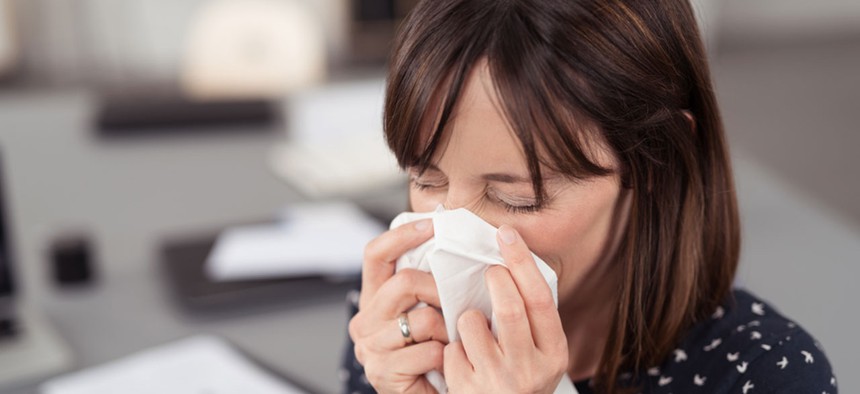
racorn/Shutterstock.com
There’s a Word For Our Compulsion to Go to Work When We're Sick
It entered the management lexicon in 2004, but dates back to at least 1892, when it showed up in a Mark Twain novel.
Hillary Clinton did it. George H.W. Bush did it. Most of us have done it at one point or another. We’ve gone to work sick when we should have stayed home.
The practice is so common there’s a word for it: Presenteeism.
Presenteeism, as in the opposite of absenteeism, is prevalent enough that it’s been analyzed, studied, and used as an argument for making paid sick leave mandatory. The term dates to at least 1892, when Mark Twain used it in his novel The American Claimant. It entered the management lexicon in 2004, when Harvard Business Review discussed its impact on business.
The cost of presenteeism is not easy to calculate—estimating how much value is lost to unproductive work is tricky—but one estimate says the loss to the US economy could exceed $250 billion a year, making it an even more expensive problem than absenteeism.
The most common causes of lost productivity on the job are sleep disorders, depression, and fatigue, according to the Integrated Benefits Institute, which researches health and productivity. Allergies and migraines also take their toll.
So why do we work our way through the discomfort? The causes of presenteeism vary, according to one study. For some workers, it’s a lack of paid sick leave, or fear of losing a job if too much time is missed. Others feel they’re too important to skip work.
It doesn’t help that our culture celebrates toughing it out, and that we praise workers who never take sick days (like this UK train dispatcher who didn’t use one in 66 years). Two-thirds of Americans think employees who come to the office sick are hard workers, according to a 2014 survey by NSF International.
In a world where physical labor is giving way to desk jobs, powering through illness is a way for workers to demonstrate toughness and commitment. But the strategy can backfire, as Hillary Clinton learned when she continued to make public appearances during a bout of pneumonia. The physical weakness she experienced at a 9/11 memorial event in New York did no favors for her campaign’s productivity, although it has kept her critics plenty busy in the days since.
Sometimes, it really is better to take the sick day.
NEXT STORY: Why the EPA Doesn't Regulate Ocean Acidification






